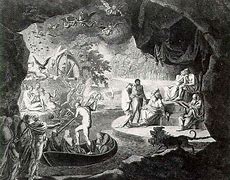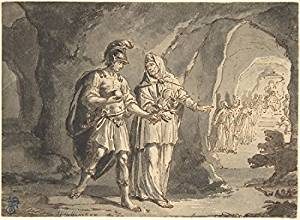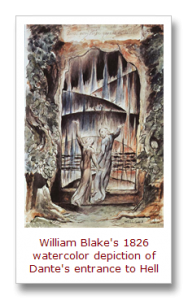There is a reoccurring theme in this book about Robert Audley being lazy and George leaving him during his restful moments. On pg. 75, the first page of the chapter “After the Storm”, Robert is described as sitting through the storm the same way he does every thing else in life: by lying on the couch, reading days old newspaper. Within the same paragraph, they transition to talking about George Talboys who is active, fearful of the storm, and moving around the room, and leaving him to go outside to walk in the rain. On pg. 99, the first page of “Troubled Dreams”, Robert Audley is described using the word “lazy” once again, but this time in a complimentary way, as he is has been searching relentlessly for George Talboys. Within this same paragraph George Talboys is brought up talking about George as to how he left Robert again, but this time while he was being lazy, sleeping during fishing much like the language used on pg. 75. After the narrator is complimentary of how hard Robert has worked for 48 hours trying to find letters that George left behind, the narrator delves into Robert’s sleep and dreams. He goes to bed until he woken up by someone at the door. The narrator’s language surrounding Robert has led me to believe that they blame, in some way, George’s disappearance on Robert’s laziness. If he had just been up while they were fishing maybe George wouldn’t have disappeared. Even the way that the narrator depicts Robert’s search for George is sluggish, taking breaks for naps frequently and moving slowly on the mystery of his disappearance. I would argue that the language the narrator uses is purposeful. In a few paragraphs the narrator is describing George and Robert as binaries, one passive and one active. In more than one case as well, the narrator is connecting Robert’s lazy, sleepy nature to George being gone and having left during that time of rest.
Category: 2018 Blog Post
Lucy After the Storm
I have chosen to analyze the third paragraph on page 78 of the novel that details Lady Audley’s behavior after the storm. This passage describes the sharp contrast between the frightened Lady Audley and her behavior after the storm that caused her to behave strangely. The passage parallels the passages on the previous page, which detail George Talboys’ similar reaction after the storm. In this passage, Lucy is compared to fresh flowers and birds. Her cheeks were described as being pink, indicating passion and liveliness, and she was described as beautiful and joyous in the same way that the birds were. This imagery comparing her to birds is continued when the author describes her singing as warbling. The passage is full of imagery of nature, flowers, and light. Nature is a common motif throughout the novel, often used as further indication of how a character feels. The passage shows how Lucy’s behavior contrasts how she felt during the storm, as she felt much happier in the safety of the daylight. In the next paragraph, her husband recounts, “Do you know, Lucy, that once last night, when you looked out through the dark green bed-curtains, with your poor white face, and the purple rims around your hollow eyes, I had almost a difficulty to recognize my little wife in that ghastly, terrified, agonized-looking creature,” which sharply contrasts the imagery in the paragraph before it (Braddon 78). Like a child, Lucy is afraid of the storm as well as many other common fears in childhood such as dogs and even cows. This passage reveals to the audience that Lucy has odd, childlike behavior and yet is similar to George in that they were both terrified of the storm and recovered beautifully afterwards. This passage foreshadows a possible link between Lucy and George to be explored later in the novel, and uses imagery of nature to convey Lucy’s emotions.
“What’s in a painting” – or how we see past initial appearances of a character
“The perfection of feature, the brilliancy of colouring were there; but I suppose the painter had quaint medieval monstrosities until his brain grown bewildered, for my lady, in his portrait of her, had something the aspect of a beautiful fiend” (Braddon 107)
This little passage is strikingly intriguing: in the context of the scene, it involves Robert and George discovering a painting done of Lucy Graham, now the new Lady Audley, whose painting is described above by our yet unknown narrator in much contrast to how she is originally described. Early on in the novel, Lucy Graham is portrayed as someone “lovely and innocent”(Braddon 49) and now she is described as resembling a “beautiful fiend” in her painting.
As far as history goes, there has been a pervasive idea that a portrait contains a part of someone’s soul, and thus offers a glimpse into their true nature. Contemporary literature at the time like Robert Browning’s My Last Duchess poem and Oscar Wilde’s Picture of Dorian Gray all played around with the idea of a painting being thematic to express a look into someone’s true character. Similarly, up till now, Lady Audley’s duality has been alluded towards sparingly, but made more explicit with the notion of her being a hidden monster, that a painter had been able to look past her surface and into her inner thoughts, and exposed her for what she is.
The imagery described, references to “quaint medieval monstrosities” gives us a visual idea of what might be running through the painter’s head as he worked on it, and the description of him becoming ‘bewildered’ shows strong language that wants us, the reader, to understand the growing horror of the painter as it dawned on him, that Lady Audley was not who she really was.
You Can’t Ask Too Much of Me
On page 16 Lucy responds to Sir Audley’s proposal. Her speech caught my attention because the raw emotion she exhibited. Which, allowed me to better undertsand and relate to her character. Braddon chose to start off this paragraph with emotional words that also revealed the importance of the passage, such as passion, agitated, shrill, piercing, and distinct. These words allowed me to better undertsand what Lucy is going through and how imperative her statements are to her beliefs and actions in the novel. After, Braddon adds statements of doubt that show Lucy’s lack of confidence and foreshadow her having a dark past. Lucy’s states that “There are women a hundred times my superiors in beauty and in goodness.” This surprised me because the pages leading up to her speech talked so much about her beautiful outward appearance. Lucy then repeats the 3 times that “you ask too much of me” (Braddon 16.) At first, I was confused by Lucy’s doubt, but then I realized that her Lucy’s appearance was not the only thing she was worried about. Braddon foreshadows that Lucy’s previous actions are also are also stopping her from being a worthy wife. Lucy then reveals the struggles of impoverished past, she explains that “Her father was a gentleman; clever, accomplished, generous, handsome – but poor.” (Braddon 16). This juxtaposition shows that Lucy understands the importance of wealth, Lucy says all these redeeming qualities about her father but finishes off with “but poor” potentially indicating that in her wealth trumps everything else. Lucy finishes of her speech by saying “I cannot be blind to the advantages of such as alliance” (Braddon 16.) This again shows her understanding of what wealth can do, but may also explain her thoughts on the marriage. Lucy calls her marriage an alliance, hinting that she is not in it for love but rather the benefits it will give her.
Audley Court as the Underworld
“The sun was low in the skies as they took a short cut through the meadows, and crossed a stile into the avenue leading to the archway– a lurid, heavy-looking, ominous sun-set, and a deathly stillness in the air, which frightened the birds that had a mind to sing, and left the field open to a few captious frogs croaking in the ditches,” (Braddon 67).
I believe Braddon is intentionally presenting the Audley Court as the underworld. It is grand (the underworld is often associated with jewels and wealth) but eerily still, with a literally “deathly” lack of movement. The sun-set (note that the sun is going down, leaving the world in darkness and bringing out the predators and fears of the night) is “lurid, heavy-looking, ominous…” and leaves behind it none of the suggestions of life or vitality that are often coupled with sun imagery– in fact, Braddon gives us the opposite. The “short cut” and “meadows” that George and Robert take suggest danger (short cuts make long delays, Persephone is stolen in a meadow) that great mythological heroes often face when straying from assigned paths (Odysseus, Theseus, etc.). The “archway” that Braddon describes is a symbol associated with the underworld (see images below). The implication of presenting Audley Court as such just as our “hero” (George) and his friend (Robert) makes it clear that this will be the end of the current phase for them. It also implies that the inhabitants (Lady Audley) are not so innocent or lively as they intentionally present themselves as being.


Arnold Houbraken, Alamy Stock Photo

https://www.youtube.com/watch?v=Gt3H5bBJypU
Link: (0:46-End) Sirius Black death: passes through archway
False Appearances
“Foul deeds have been done under the most hospitable roofs, terrible crimes have been committed amid the fairest scenes… I believe that we may look into the smiling face of a murderer, and admire its tranquil beauty” (Braddon, 143-144).
This passage comes from an exchange between Robert Audley and Lady Audley during an unexpected visit she makes to the inn. Robert demonstrates his role as the detective, suspecting that his dear friend, George Talboys, has been murdered, possibly in an unexpected place: the domestic home. Robert emphasizes the ironic situation of a horrid event occurring in a seemingly safe place. He explains that “foul deeds” and “terrible crimes” have taken place “under the most hospitable roofs” and “amid the fairest scenes.” The contrast between the harmful acts and peaceful environments implies the greater theme of false appearances throughout the novel. Furthermore, Robert detects false appearances in people, specifically murderers. He states, “I believe that we may look into the smiling face of a murderer, and admire its tranquil beauty.” He reveals his beliefs that a calm and appealing exterior, in this case a “smiling face,” may belie an ugly and dangerous truth, which potentially foreshadows that one or more of the characters in the novel will be discovered to possess a shameful secret or mad behavior. The barrister acknowledges that “we” are oblivious to the dark secrets and crimes that are occurring, suggesting that the characters are being deceived by a harmless appearing “atmosphere,” a house, or another character in the novel. However, because the conversation is between Robert and Lady Audley, the barrister may be hinting that Lucy, herself, is the one who’s innocent appearance is concealing a dreadful secret.
Blog Post #1
One paragraph that stood out to me in Lady Audley’s Secret was the first paragraph on page 57. In what seems to be an act of foreshadowing, Braddon is describing a beautiful countryside in comparison to cruel murders. Tranquil words such as “quiet”, “rustic”, “sweet”, and “calm” are used in comparison to cruel words such as “agonies”, “poisoned”, and “violent.” The words murder and peace are repeated throughout the paragraph, juxtaposing the beauty of nature and peace with the violent nature of man. The “spreading oak, whose very shadow promised – peace” is juxtaposed with “sudden and violent death by cruel blows”, displaying the antipode ideas of peace and chaos. Braddon describes a meadow on a quiet summers day contrasted with the murder and betrayal of a young woman by the man she loved and trusted, introducing the idea of evil in what seems to be a tranquil place. The contrast between chaos and peace is perpetuated by the lengthy, vivid crimes, ending with just one word – peace. By incorporating the emotions of chaos and peace into the same sentences, Braddon juxtaposes the images of violence and beauty. This suggests that chaos and beauty are not exclusive from each other. This idea of beauty and tranquility hiding dark, cruel secrets and the suggestion that chaos and beauty are not exclusive may be indicative of Lady Audley. Throughout the book, she is continually described as being an unmistakably beautiful girl, but this passage may be suggesting that she is hiding darker secrets
What is Lady Audley’s Secret?
In the novel, Lady Audley’s Secret, by Mary Elizabeth Brandon there have been many secrets and mysteries that have presented themselves throughout the course of volume one. Aside from the disappearance of George Tallboys, one of the largest mysteries is what exactly is Lady Audley’s secret? A passage on page 91 leads me to believe she had something to do with Georges disappearance, and that the two huge secrets in this novel are intertwined. “It was not one, but four slender, purple marks, such might have been made by the four fingers of a powerful hand that had grasped the delicate wrist a shade too roughly…Across one of the faint purple marks there was a darker tinge, as if a ring worn on one of these strong and cruel fingers had been ground into the tender flesh” (Brandon 91). This passage originally struck me as interesting because it contained a clue to one of the mysteries. Sir Michael Audley is narrating this passage and has noticed these marks on Lady Audley’s wrist. She protests that it was only a ribbon that caused them, but her determination to make everyone believes this leads me to believe she is trying to hide something. The contrasting language in the passage, such as powerful, strong and cruel, vs. tender and delicate as well as the repetition of fingers and four point to the main idea of the passage- four rough fingers left the marks on Lady Audley, not a ribbon. I believe the fingers belong to George, who was last seen at Lady Audley’s house before his disappearance and potential murder. I assume he would have been wearing a ring because of his long-standing love for his late wife.
A Noble Place (Blog Post #1)
One of the passages that I can’t seem to get out of my head is the description of the mansion on page 8. The first thing that I noticed was that it was a paragraph-long sentence. Braddon thought that it was necessary to take up this much room on a page in one sentence describing this place. Definitely something to be noted. This led me to believe that this is a critical point in the book, and not just because it was describing the main setting of the story. When I read this passage I felt like Braddon was trying to let us in on a secret. A phrase that caught my eye was, “…a house in which you incontinently lost yourself if ever you were so rash as to go about it alone.” (Braddon 8). In this phrase, I got the sense that there was just something different about the mansion. But then I thought, maybe she wasn’t talking about the mansion. Maybe she was foreshadowing about an incident later to be explained, where someone wandered the house alone and something happened to them. In this incredible amount of detail, she uses mysterious words like, “incontinently,” “rash,” and “chambers.” I brought up “chambers” because it sounds more mysterious and secretive than, “room.” All these words lead me to believe that this place is just plain creepy! No wonder it is the setting for a mystery novel. In a sense, this passage sets up the entire novel. It sets the tone for a mysterious, secretive, and sensational story.
Page 57 Countryside Extended Close Reading
I have chosen to analyze the first paragraph on page 57, which discusses in detail the mystery of the countryside. The passage uses words like “peace”, “quiet”, “sweet rustic calm”, “tender”, and “yearning” to describe the meadow, and the countryside in general. This gives the readers a sense of comfort, but it is also harshly juxtaposed by the violence that is associated with the country. Words such as “agonies”, “poisons”, “violent deaths”, and “crime” are also used to describe the meadow and the murders that have occurred there. The passage describes a farmer killing his wife who “loved and trusted him” in the meadow. This leads me to believe that someone has or will decide to murder another character who loves or trusts them in the novel, potentially in the secretive landscape that surrounds Audley Court. One word that stood out to me in the passage I chose was half-mournful. It was used to describe the way we look upon the meadow. The use of half-mournful shows that the murders and violence are not far from the minds of the people who look upon the peaceful meadow. However, in spite of all the violence that has occurred, we choose to ignore it and focus on the peaceful, sweet serenity we find in the meadow. I think that this relates to the work as a whole because the characters in this novel look innocent and lovely on the surface, like the meadow, but they hold darker secrets within them. Also like the use of “in spite of all” in the passage, the characters are known for having secrets, but most people are choosing to overlook them and keep idealized views of them, especially Lady Audley.